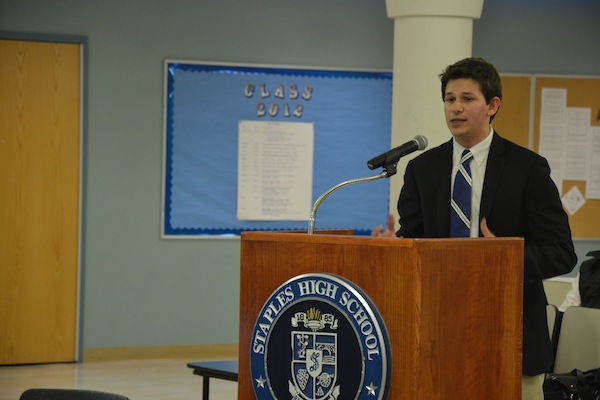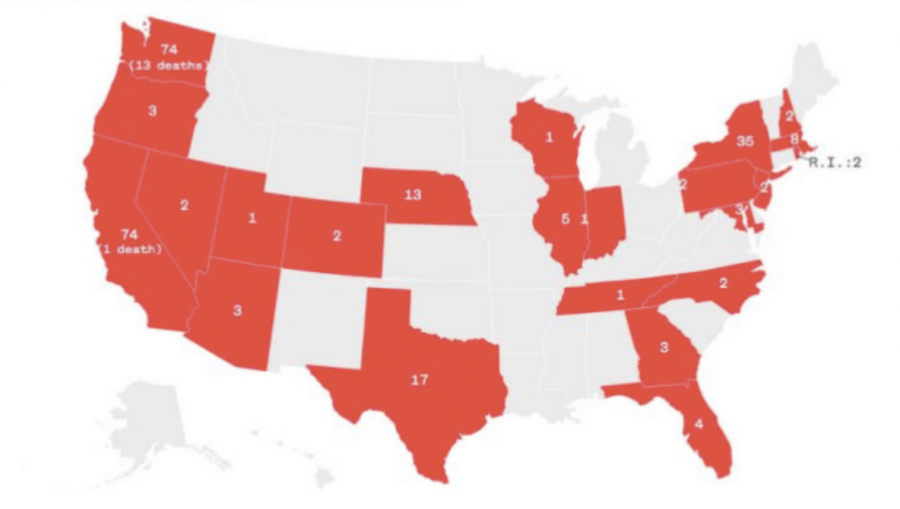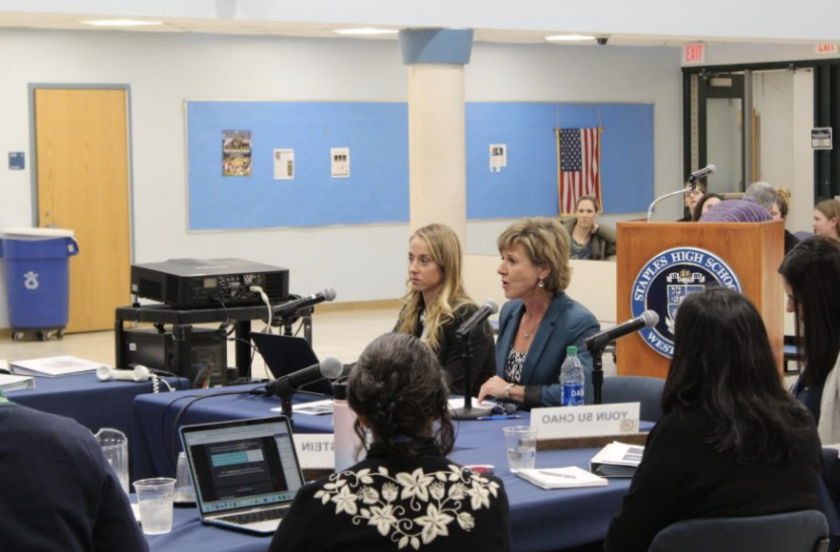In its May 25 editorial, Inklings urged Staples students to “find their thing,” to pick an issue that they feel passionate about and to take action. At 8 p.m. on June 4, members of Julia McNamee’s period five AP English Language class found their thing.
A group of 11 juniors settled into their seats amongst a half-full room of BOE members and public attendees. Unbeknownst to anyone, these students would speak in regard to the flaws of SB 24, an education reform bill that has been debated tirelessly throughout Connecticut within the past few months.
Leading up to the English AP exam, the class studied rhetorical devices and techniques in which to effectively present an issue or portray a message. Following the May exam each year, McNamee guides her students in building a class initiative, a way to incorporate rhetoric into a subject the students feel strongly about.
This year her class decided to focus on SB 24, and specifically the destructive qualities of standardized testing.
“We had talked about SB 24 in our class because we’ve heard about the protests…we decided that we were going to try to influence the amendments that are being made to the bill that we don’t agree with,” Tory Scordato ’13 said.
As the bill stands, SB 24 maintains that 22.5 percent of teacher evaluation is based on standardized testing.
The class decided earlier in the day, on a whim, to present at the BOE meeting scheduled for later in the evening. Within a matter of hours, students wrote speeches and organized the protest of provisions of the bill.
The first 15 minutes of BOE meetings are open to public remarks and speeches—five of McNamee’s students presented at this time.
“[The bill] puts too much focus on standardized testing. It’s going to create a more vapid, boring learning environment that will drive away students and dispel the love of learning that can be instilled in students early on through more creative approaches,” Will Horne ’13 said in his speech.
The class’s cumulative concern was that teachers will fear for their jobs and teach solely to the test, thus detracting from the creativity and critical thinking imperative in an increasingly globalized world.
After BOE members thanked the students for presenting and reminded the public that only 15 minutes are to be allotted to unscheduled speeches, Board member James Marpe acknowledged the flaws with SB 24.
“I wish I could tell you we can sweep away the standardized testing part, but I don’t think I can do that. So I hope the remaining 77 percent is more accurately representative,” Marpe said. “This is all about you as students; it’s about how we make sure that you as students get the very best education you can possibly get.”
After the meeting, McNamee’s students gathered outside of the room and reflected on their proactive evening. The buzz was palpable—a glow that represented student collaboration and passion, a glow that represented what they just preached to preserve in schools.
Rory Siegel ’13, a stand up comedian, opened his speech admitting that he had never been more nervous for a presentation than that one because he was talking about “something that truly matters.”
“It was exciting because you don’t often get those opportunities to talk. So when a class comes together and decides something is important enough to talk about, it’s really empowering,” Rory Siegel ’13 said.
Juniors Will Horne, Callie Ahlgrim, Rory Siegel, Andrew Bowles, and Michael Holtz all spoke. Alexandra O’Kane, Olivia Stanley, Ben Reiser, Tory Scordato, Jordan Shenhar, and Alex Greene were present at the meeting.




















































Staples Senior • Jun 8, 2012 at 11:04 pm
I do agree that this bill places too much emphasis on standardized testing to evaluate teachers. However, I feel that this issue has turned into an attack on testing as a whole. I watched the Youtube video containing portions of these students’ speeches. They say that standardized tests are “ineffective” and “test all the wrong things” but do not give solid reasons for why that is. Arguments can just as easily be made for the immorality/subjectivity of other measures of student aptitude, including grades.
The students also mention the importance of “critical thinking” and “forming opinions,” but many of them on Facebook are attacking students with “unpopular” viewpoints on this issue. That, to me, is not an example of an environment that fosters critical thinking and healthy debate.